PostClassic: September 2007 Archives
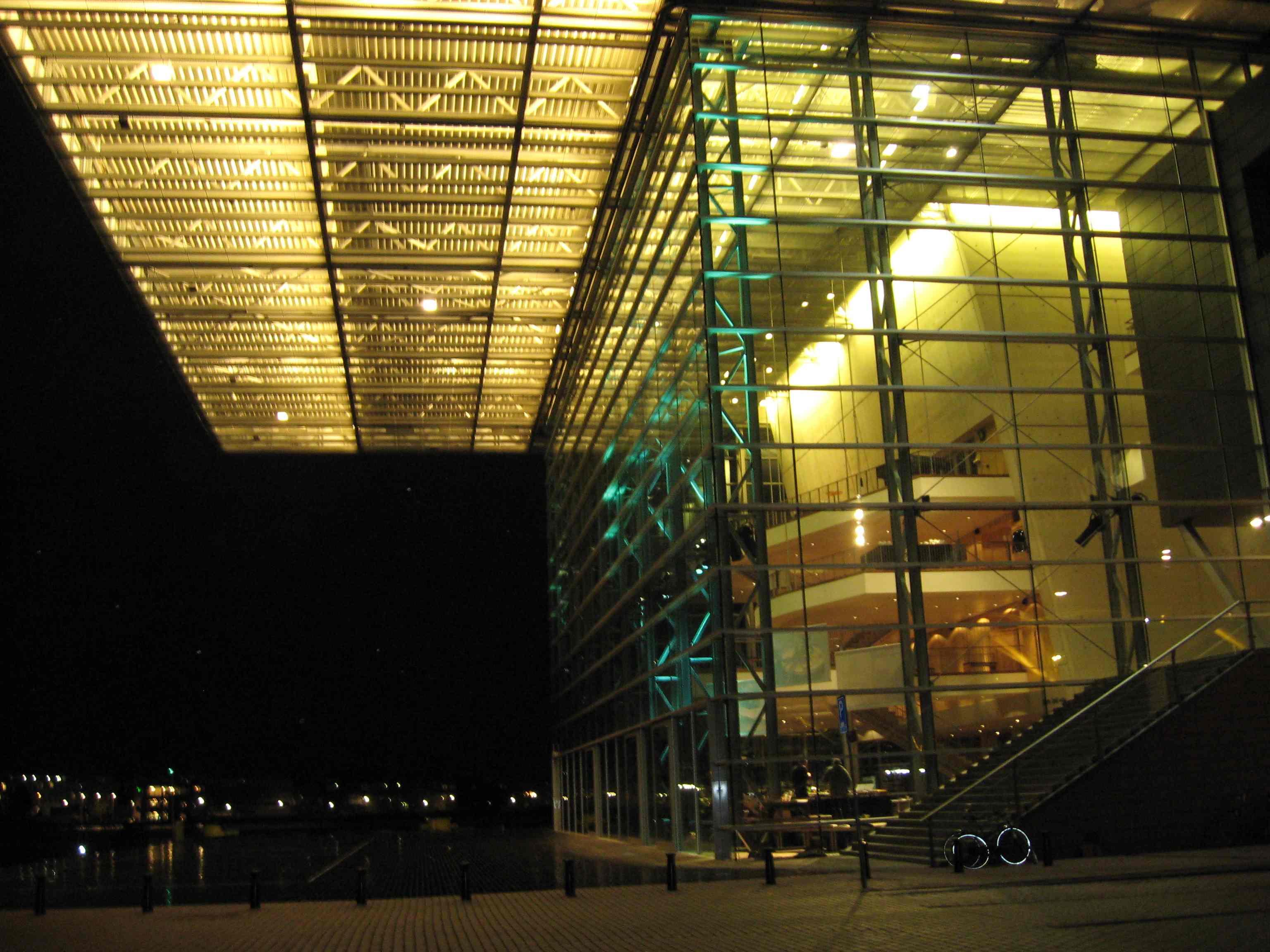
AMSTERDAM - The new Muziekgebouw hall on the Amsterdam waterfront, which only opened about a year ago, is a spectacular space - or rather, spectacular collection of spaces. In addition to the comfortable and precision-engineered main hall, there is the upstairs black box called Bimhuis (billed as a space for jazz and improv, but actually perfectly well-suited for new music in general), as well as several vast foyers superb for concerts, sound installations, and the like. I'm halfway attending the Output festival of new music employing electric guitars, but mainly hanging out with John Luther Adams, two of whose installations are involved in the festival. Guitarist extraordinaire Fred Frith improvised along with John's Veils last night, and I've also been hanging out with Renske Vrolijk, Anthony Fiumara, Tim Brady, Derek Bermel, and the ubiquitous Samuel Vriezen:
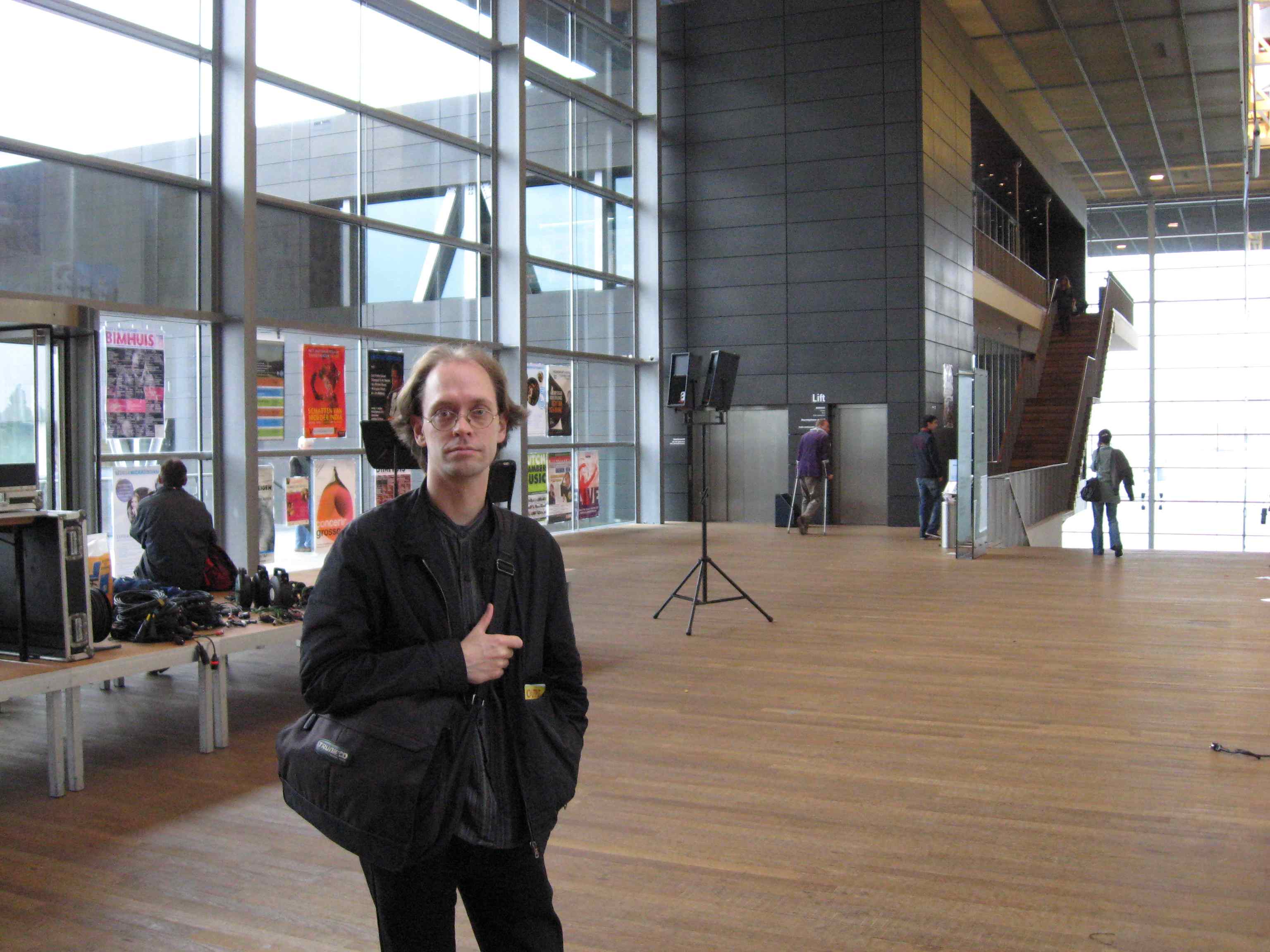
The Muziekgebouw is also where the Orkest de Volharding will perform my piano concerto October 31. It appears to be where almost all Amsterdam new-music activity takes place these days.
Today I'm giving a lecture on Nancarrow's late player piano studies at the Royal Conservatory in Aarhus, courtesy of expatriate American composer Wayne Siegel, whose music I've been following for more than a couple of decades now. I suppose it's not an event open to the public, but I'm not sure.
One that is open, though, will be a performance at the Weis Center at Bucknell University in Lewisburg, PA, this Friday night at 8. Lois Svard, assisted by pianists Megan Rowland and Anja Wade, will play my Long Night for three pianos. Although Sarah Cahill's recording came out a couple of years ago, the piece hasn't been performed publicly since New Music America 1982 - which, coincidentally, was the festival Wayne Siegel and I were both on. Lois is also playing solo works by two of my best friends, William Duckworth and George Tsontakis. I call the concert "Kyle Gann and His World." They don't.
I, however, will be in Amsterdam by that point. And my next performance is October 9 at the Karnatic Lab there. I'll give you details later.
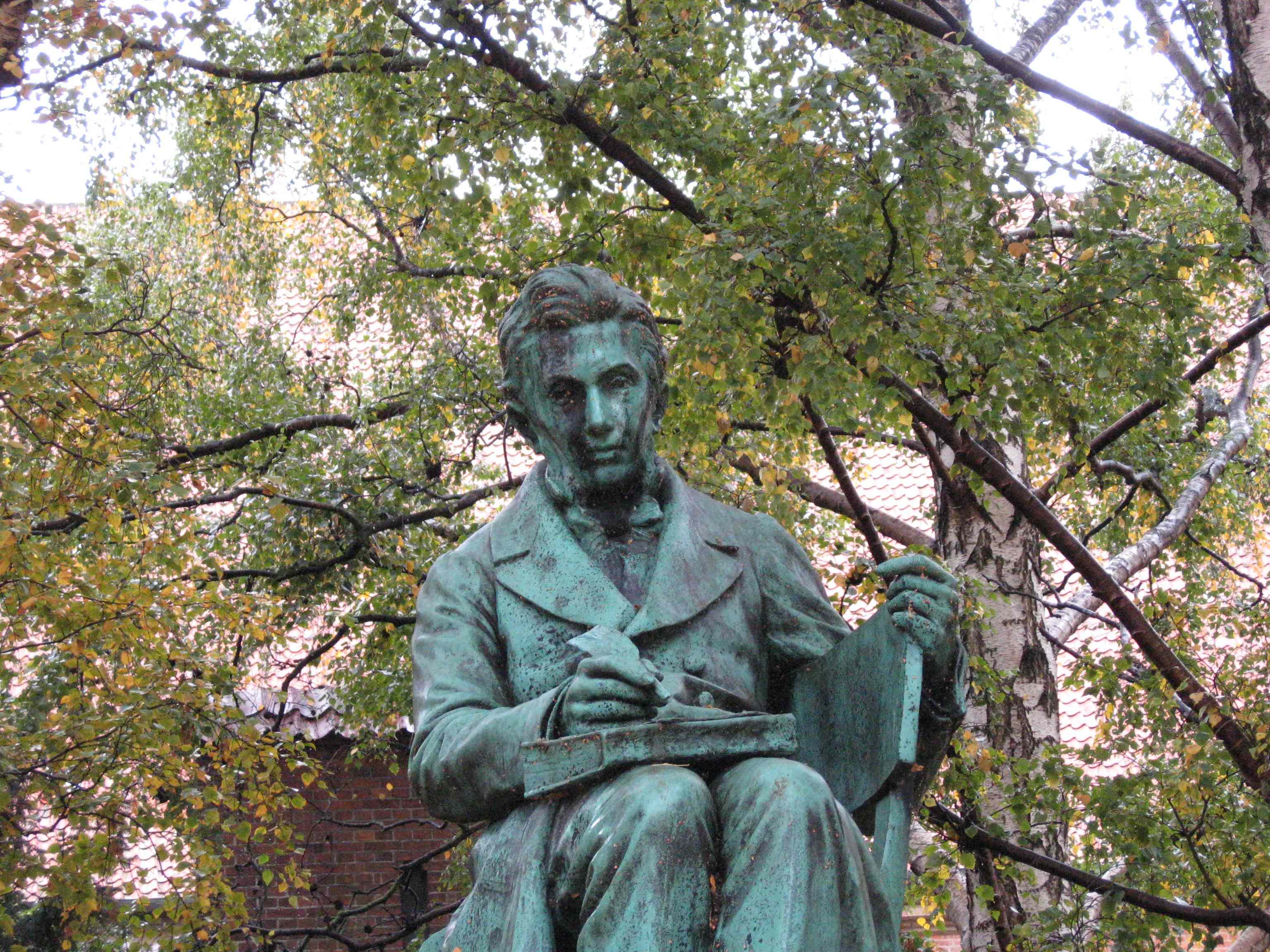
And one more, Nytorv Square, where Kierkegaard grew up:

It's not only about Kierkegaard, but about the regret of being a historian from a young country, and wanting to make the 1840s come alive.
The house in which Kierkegaard grew up, and which he later owned (buying out his brother's share), was on a site where the Danish Bank now sits, though there's a plaque making the spot:
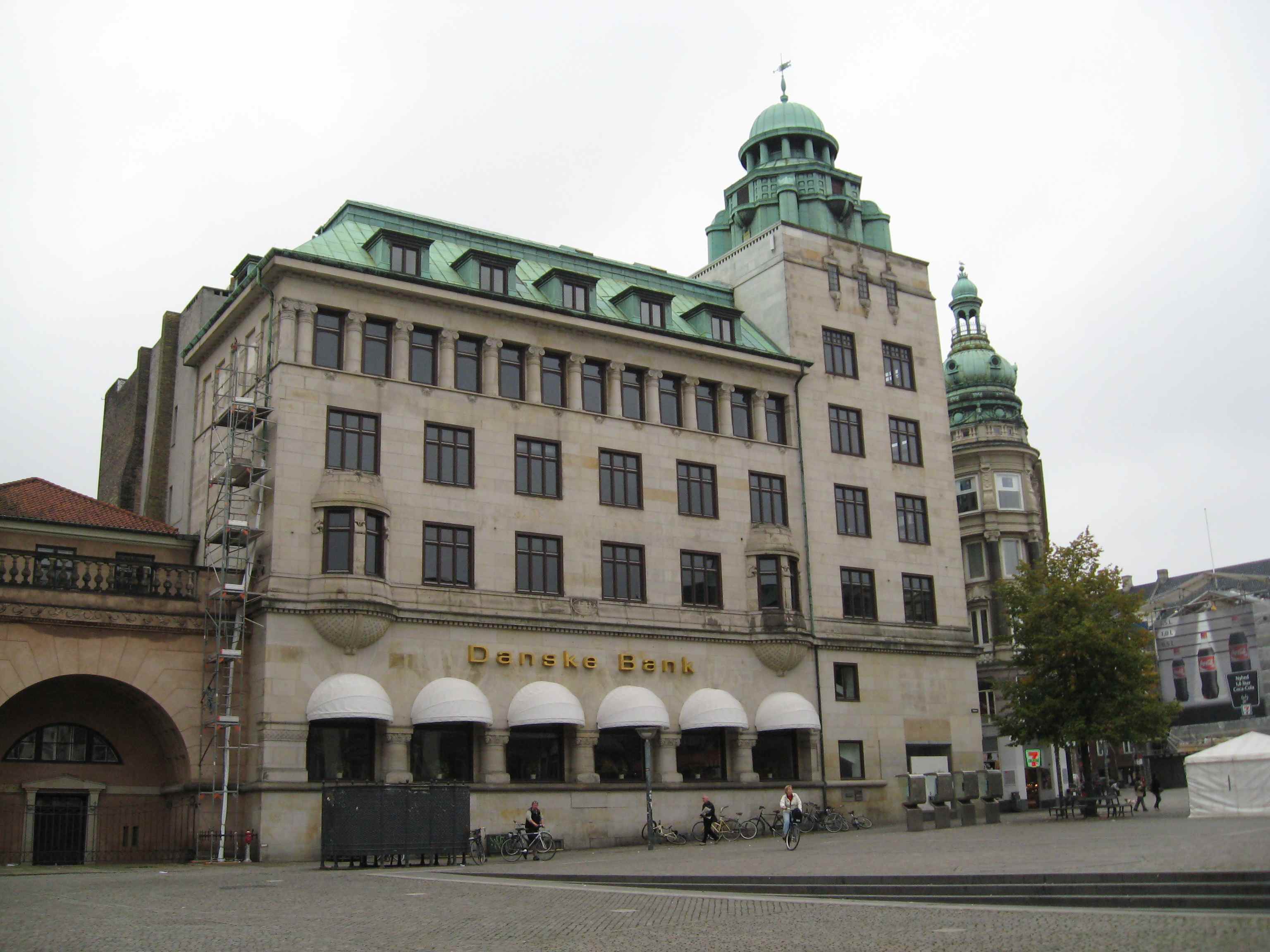
I had lunch at a diner, across the square, that was built around 1830. Prostitutes used to frequent it, and you can't tell me Søren never went in there. His final address was 38 Skindergade:
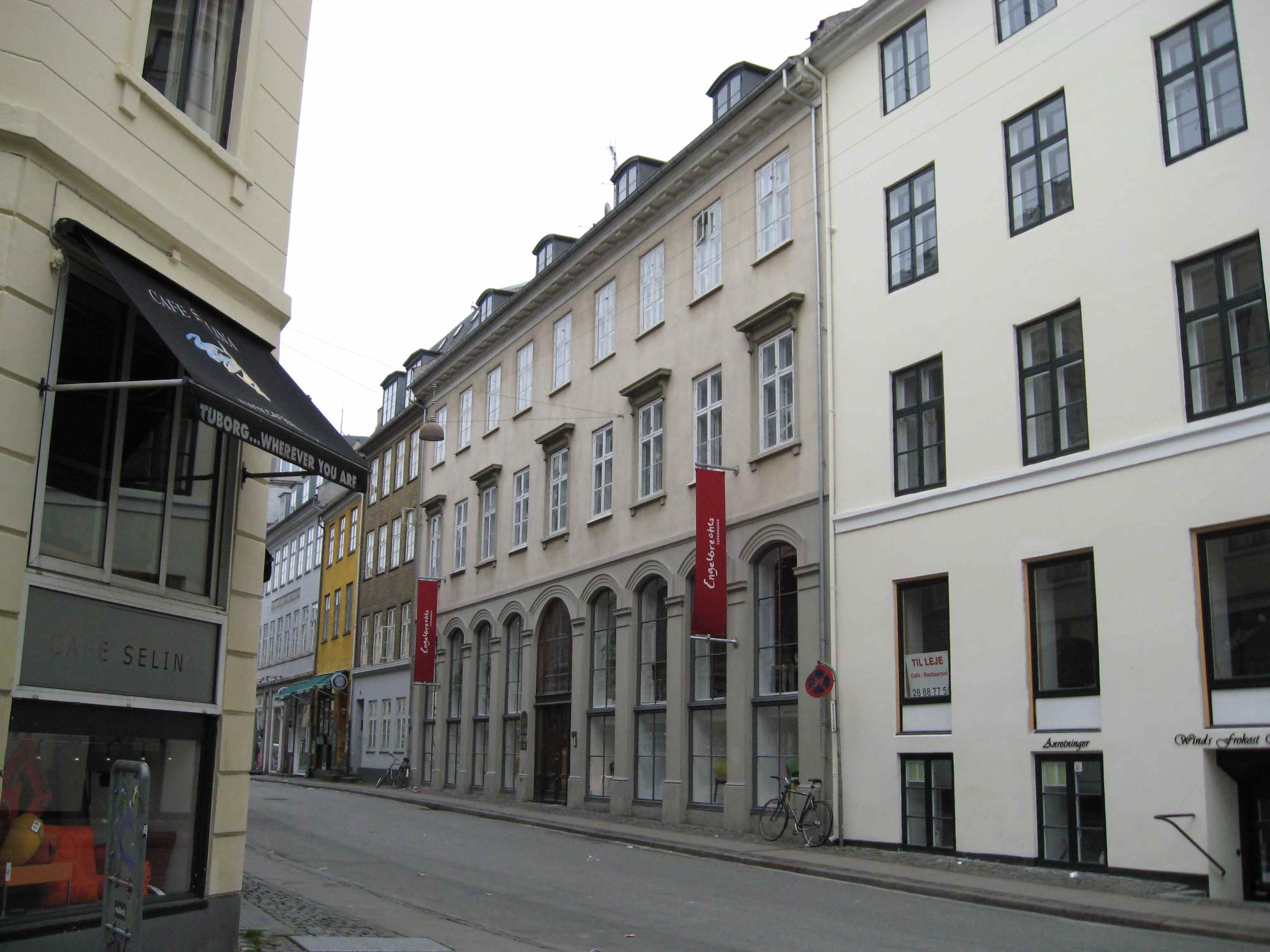
Vor Frue Kirke, Our Lady's Church, is so large, and the neighborhood around it so crowded, that it's difficult to get far enough back for a decent photo. But I went to a service there Sunday night, where the soprano and organ both performed in the most meltingly pristine timbres:
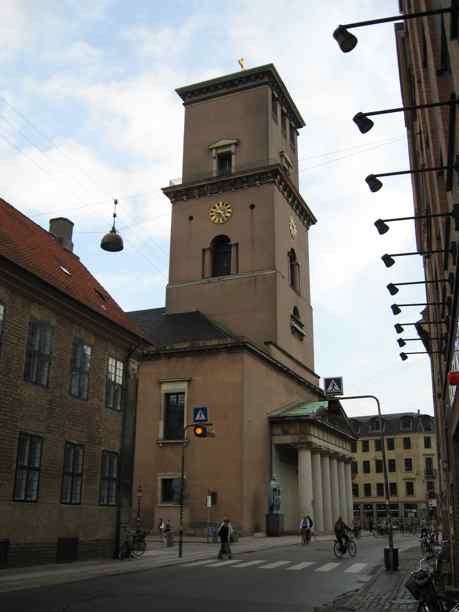
Finally, Monday afternoon, I caught up with the guy I'd been looking for. Turned out I was 151 years too late, but we still enjoyed a cigar together (only vicariously on his part):
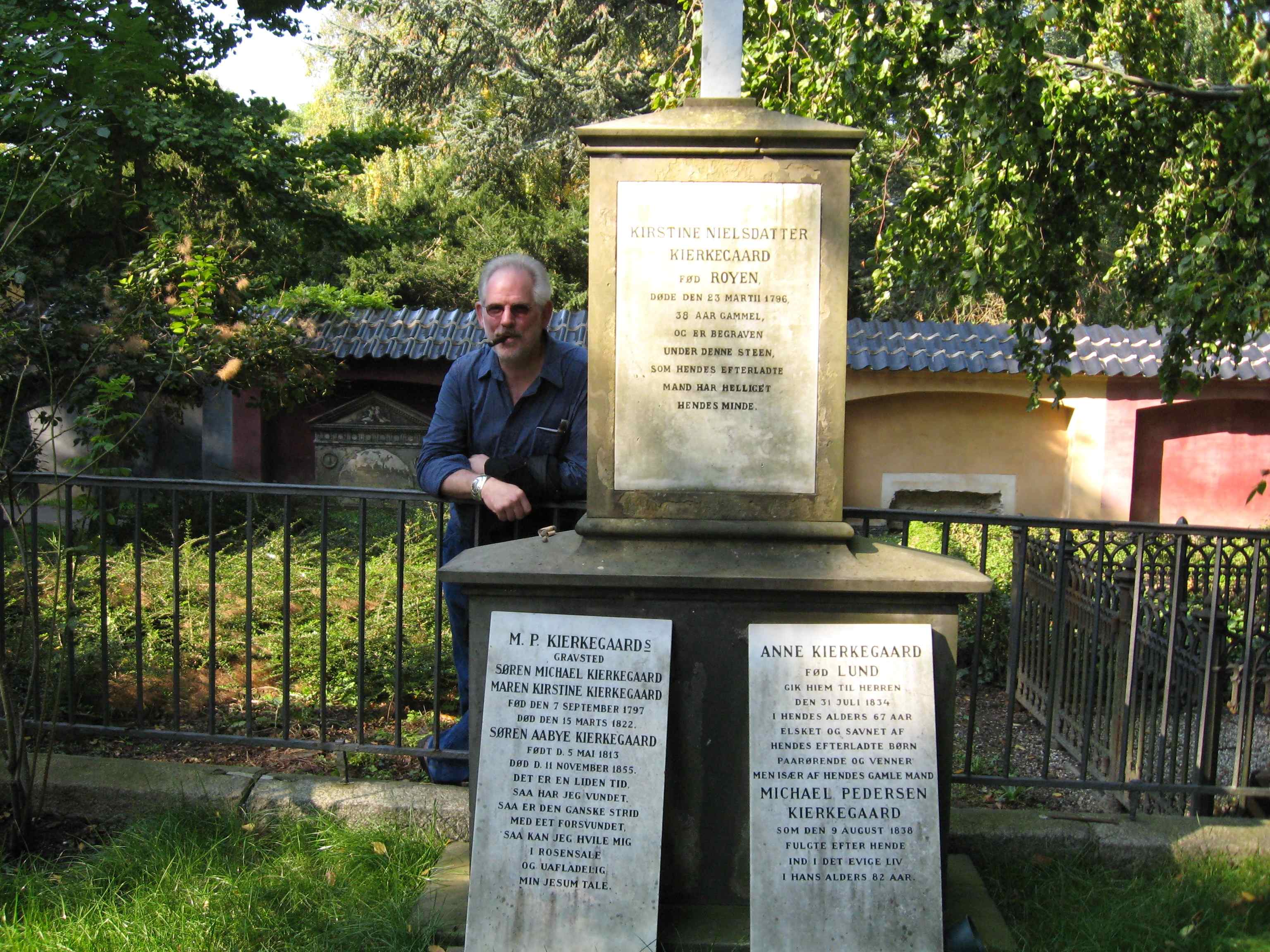
All around him are burgomeisters and local dignitaries with big monuments graced by busts in relief - but Kierkegaard, appropriately parallel to Thoreau, is just one unaccented figure in a family grave. The tombstone, according to a site I found on the internet, is a verse from an 18th-century hymn by Hans Adolph Brorson, translating as follows:
There is a little time,
Then have I won,
Then will the entire strife
Be suddenly gone,
Then can I rest
In halls of roses
And ceaselessly [with]
My Jesus speak.
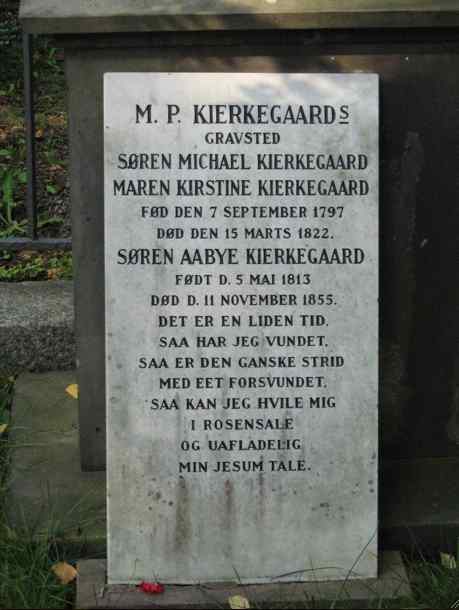
I won't show you Hans Christian Andersen's grave, or the statue of The Little Mermaid, because you've seen it and I wasn't very impressed. But lastly, for Alex Ross, here's the site of another inextinguishable Dane:
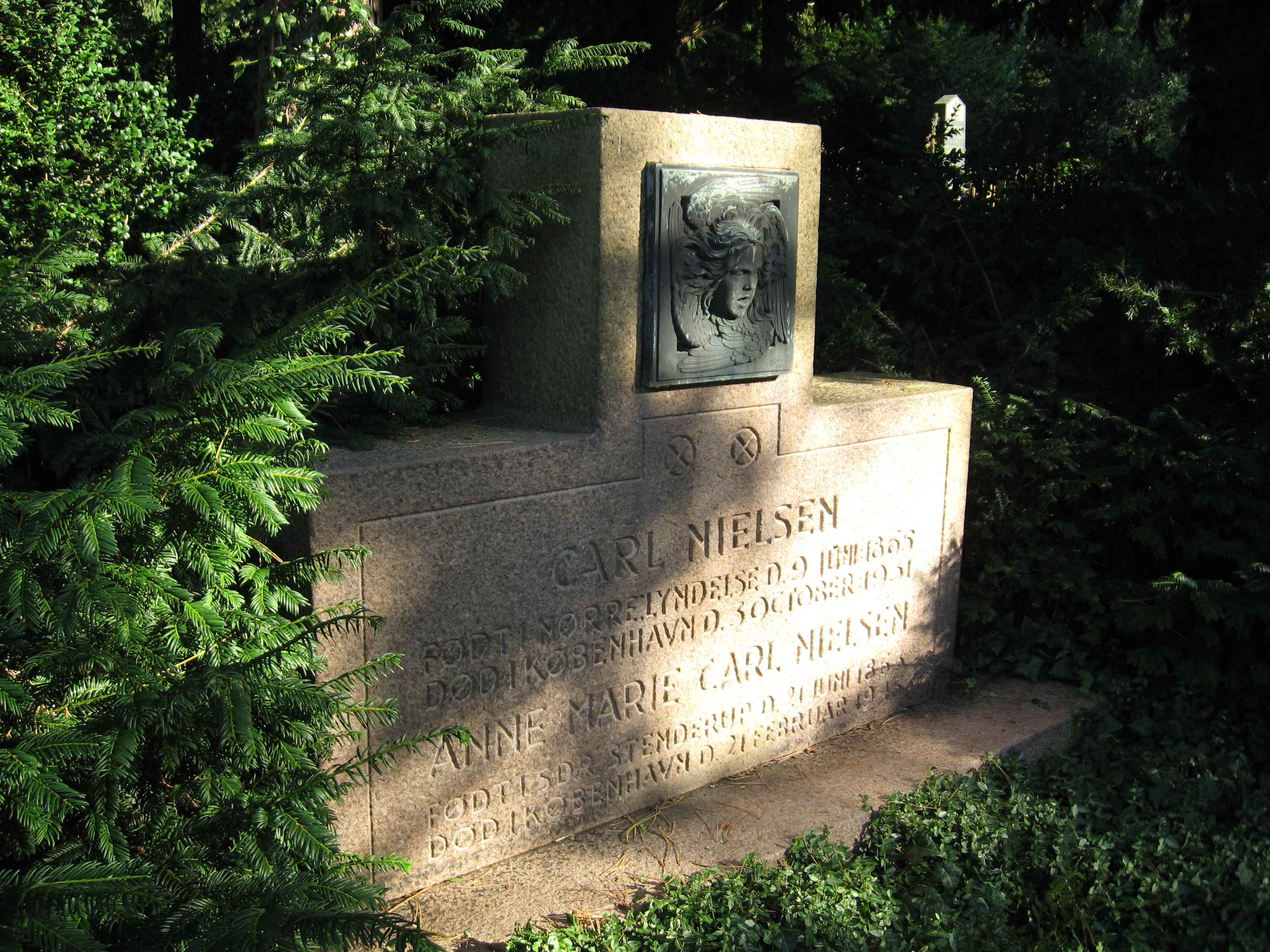
You can't believe everything you read in music reference works, but I verified this one personally: he's dead.
I had an idea of blogging an ongoing photo essay under the rubric "Unattractive Danish Women," but I couldn't get any material. I think I could have replaced it, though, with one on "Tormented-Looking Young Danish Men." Ever since Kierkegaard, walking through town with visible signs of being haunted by existential angst seems to have become a national patrimony. Or maybe they're just all trying to become the next existentialist hero.
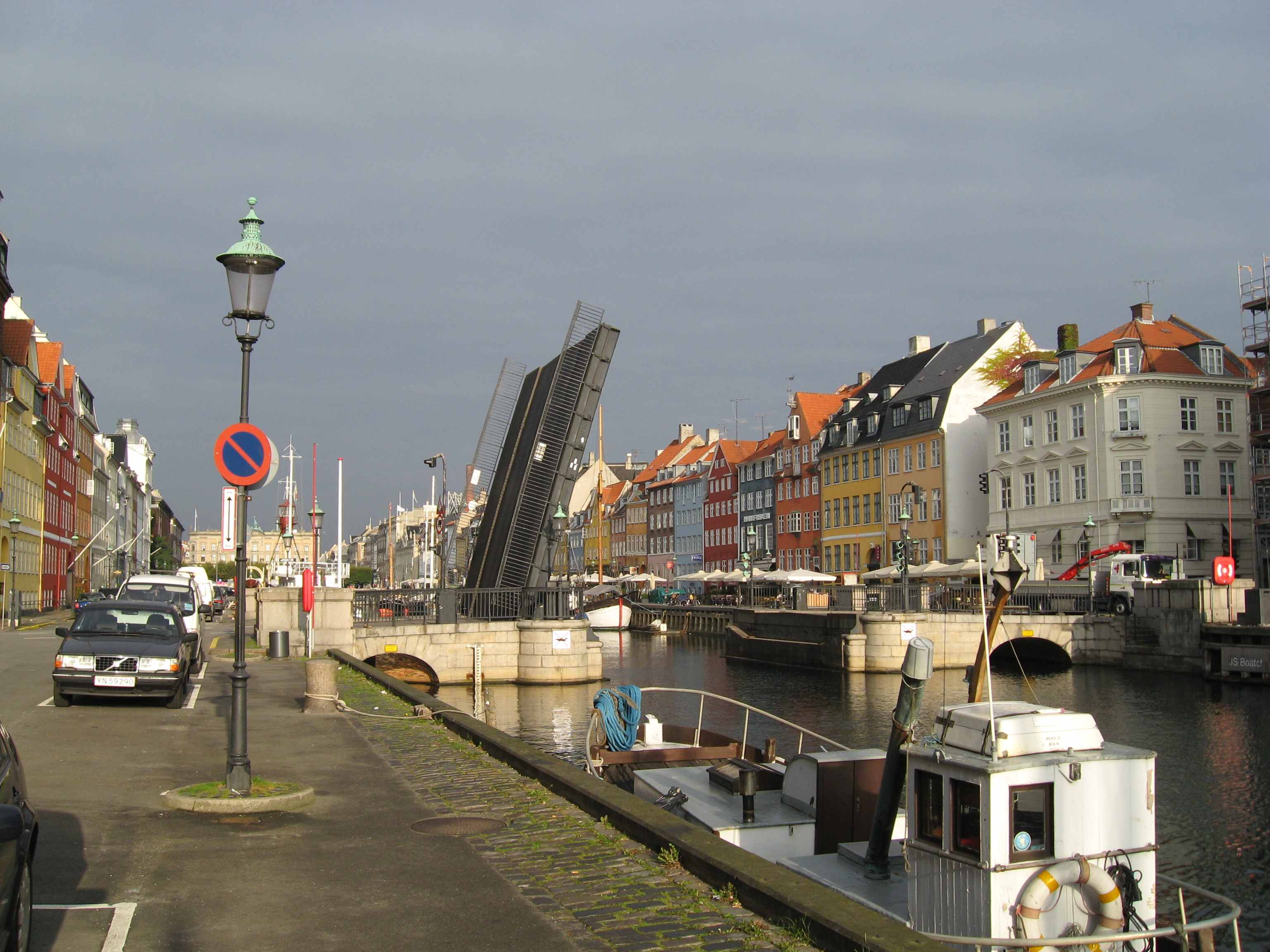
As I write this, I am finally on the plane to Copenhagen. By "finally," I mean after 30-something years. I've always known Copenhagen would draw me to it someday. It was unthinkable that, in my lifetime, I would fail to walk the streets that Søren Kierkegaard spent his life walking up and down. It is difficult to think of a writer more specifically tied to his location than Kierkegaard - the neighborhood surrounding the Vor Frue Kirke (Church of Our Lady) in which he inveighed against the local clergy by name often appears in his writings as an explicit background, and, as the most prominent writer in a language little spoken around the world, he was acutely conscious of not only being a Danish author but a Copenhagen author, speaking to a Copenhagen public with reference to Copenhagen geography. Every year I make a pilgrimage to Concord, Massachusetts, to retrace the steps of Thoreau, Emerson, and even lesser-known Transcendentalists - Jones Very and Orestes Brownson, anyone? - and doing the same for Kierkegaard is a pleasure, a mandate, too long delayed. I suppose I have a rather peculiar need to soak up the native ambience of writers who have been central to my life.
 How the theologically provocative author of Fear and Trembling became one of those writers is difficult to say. I was reading Sartre in college, without understanding him much, because existentialism seemed like the cool philosophical trend of the time. Camus had a more concrete impact. I remember thinking that The Myth of Sisyphus did more than even ale could to "justify God's ways to man." But working backward through existentialist chronology, I ran into Heidegger, Husserl, Nietzsche, and finally Kierkegaard, and while I would later explore the others, it was only this last who grabbed deeply into my imagination. Perhaps I was attracted by the glancing resemblance of his last name to my full name, or the coincidence that he died almost exactly a century before I was born. More likely his position as the first phenomenologist of anxiety, fear, and depression offered a promise of kinship to my adolescent introversion. Whatever the underlying psychology, I spent, at Oberlin, a depressive, reclusive year reading almost half of the 43 books Kierkegaard wrote in his feverish 17 years of authorial activity, ignoring all else. The next year, once that fetish had played out, I sank even further into the abyss and read nothing but Samuel Beckett, who at least had the advantage of being considerably more concise. The less said about that spiritual crisis, the better. Suffice it to say that Godot did not arrive.
How the theologically provocative author of Fear and Trembling became one of those writers is difficult to say. I was reading Sartre in college, without understanding him much, because existentialism seemed like the cool philosophical trend of the time. Camus had a more concrete impact. I remember thinking that The Myth of Sisyphus did more than even ale could to "justify God's ways to man." But working backward through existentialist chronology, I ran into Heidegger, Husserl, Nietzsche, and finally Kierkegaard, and while I would later explore the others, it was only this last who grabbed deeply into my imagination. Perhaps I was attracted by the glancing resemblance of his last name to my full name, or the coincidence that he died almost exactly a century before I was born. More likely his position as the first phenomenologist of anxiety, fear, and depression offered a promise of kinship to my adolescent introversion. Whatever the underlying psychology, I spent, at Oberlin, a depressive, reclusive year reading almost half of the 43 books Kierkegaard wrote in his feverish 17 years of authorial activity, ignoring all else. The next year, once that fetish had played out, I sank even further into the abyss and read nothing but Samuel Beckett, who at least had the advantage of being considerably more concise. The less said about that spiritual crisis, the better. Suffice it to say that Godot did not arrive.
I had been raised in the Southern Baptist Church, steeped in a representation of religion that, of course, no intellectually responsible person could permanently stomach. Its most ludicrous excess was something I once attended, at 15, called the Bill Gothard Seminar, in which the eponymous charismatic worthy tried to impress on a stadium-sized congregation that the exhortations of the New Testament were good business principles; that if we followed the Christian life we would become successful in society; and that, ergo, you could tell who the best Christians were because God rewarded them with the most money. Against this repellent positivistic caricature, still quite common among the Religious Right to this day, Kierkegaard's antipodal insistance on spirituality as a completely individual matter, and one whose rigorous fulfillment was bound to rather set a person off from society than endear him to it, seemed, to say the least, infinitely more authentic.
Of course, I was a musician too, and while the "Or" of Either/Or held a certain academic interest, it was the "Either" that I devoured with page-flipping relish. Kierkegaard's pseudonymous division of his authorship into "aesthetic" versus "ethical" or religious personas may have been ironic in intent, with a finger on the religious side of the scale, but his detailed psychology of the total aesthete was, as he knew, the more seductive. His argument about Don Giovanni - that since the seducer is the personality most trapped in time, and music is the art that deals with time, seduction is the perfect musical subject, therefore Don Giovanni is the most perfect possible piece of music - wasn't very convincing then or now, despite the persuasive fanaticism with which it is developed. But he captured and conveyed, in startlingly vivid terms, the manic subjectivism of a mental life turned away from the quotidian world and devoted to the absolute in art. To read that was a heady loss of innocence, a recognition that someone else had heard the same siren song I did - and followed it.
Ultimately, I think perhaps I found in Kierkegaard a model for the pose that takes inwardness as an absolute, defying all collective social claims. He knew that getting a degree in theology does not make one a Christian; that preaching does not make one a Christian; that going about ostentatiously helping those in need does not make one a Christian; that honors bestowed upon one by the church do not make one a Christian; that ultimately, one only becomes spiritual, becomes a Christian, by a radical adherence to one's inner voice, more likely to manifest by becoming an eccentric or even martyr than by becoming a famous preacher. To transpose the effect of this absolute to the artistic sphere is hardly difficult. One does not become an artist by getting graduate degrees in composition, by attaching oneself to famous teachers, by learning how to orchestrate proficiently, by winning prizes and commissions, by being championed by one's conductor friends, by getting hired to teach in prestigious music departments. One might very well become a "famous composer" by doing all those things, and many have. But one becomes an artist by discovering a universe inside, by having something to say and saying it, no matter how bizarrely that "it" contrasts with the musical context of one's contemporaries. Kierkegaard defended spirituality from the established church of his day, and taught me how to defend musical creativity from the established musical world of mine.
For instance: "Take away the paradox from a thinker," Kierkegaard wrote in his journals, "and you have - a professor." This thought brings to my mind the story about the visit Morton Feldman made to Northwestern when I was a grad student there, which I've related many times. Feldman spoke about how impossible it was to teach composition in a university, and one angry student asked, "How can you spend your life doing something you don't believe in?" Feldman's quizzical reply was: "That's the definition of matyoority." Mystic that he was, he could have couched his answer in more Kierkegaardian terms, that to keep alive the paradox in music is to teach composition knowing that composition can't be taught. Feldman, living the paradox and never yielding to the temptation of pedagogical certainty, was no mere professor. The gradually crescendoing influence of his music from the ground up, students first, in the 1980s and '90s was a triumph of radical subjectivity, and likewise a dramatic refutation of what one could call the Bill Gothardism of new music: the facile, bullshit assumption that you can tell who the great composers are, because they're the ones getting the orchestra commissions and Pulitzer Prizes.
Immersion in Kierkegaard was a great preparation for one who feels called upon to live a life telling the social institutions of his day: "You are wrong, you are beyond wrong, you are premeditatedly mendacious for self-serving reasons." Note that this is not identical with the potentially delusional claim, "I am right and the rest of the world is wrong." After all, Kierkegaard became famous in his 20s because his criticism of official religion found quite a bit of resonance among his and the younger generation. But he does bring us close to that wonderful quote from Thoreau: "Any man more right than his neighbors constitutes a majority of one." Kierkegaard created the template, as it were, for the irrefutable defense of subjectivity against the awesome, socially reified power of institutions with their rafts of university-certified experts. Just as the spiritual man is the spat-upon martyr, not the famous preacher, the artist is not an orchestra jockey with a long list of prizes and residencies on his web site, but someone completely uncertifiable and vulnerable - because his only possible claim on our attention is the innate persuasiveness of his musical vision. In the absolute world of art, as in the absolute world of religion, subjective inwardness reigns supreme. College degrees, prizes, institutional positions, worldly honors, laudatory reviews, objective certifications of any kind mean nothing and less than nothing. Kierkegaard made it easier to say that.
* * * * * * * * * * * * * *
Today, I admit, I can't really read Kierkegaard anymore. His energy, once so tempestuously absorbing to a kindred soul, now often seems overly neurotic. His religious concerns are not mine: indeed many think that by proving Christianity virtually absent from the Christian church, he instead proved Christianity impossible. His dialectical anti-Hegelian critique, so subtle in its circuitous machinations, is of interest only to historians of philosophy. (Though in his championing of subjectivity against all philosophical systems, he does provide yet another parallel to the implied Feldmanesque critique of mid-20th century musical ideologies.) To prepare for Copenhagen, I read instead the massive, fairly new biography by Joakim Garff, which is as absolutely complete as one can imagine, not only sifting through the entire documentary evidence of Kierkegaard's life, but providing helpful summations of most of his works, giving extensive background on Copenhagen and the otherwise long-forgotten characters in Kierkegaard's circle, and also treating its eccentric subject with a healthy blend of admiration and absurdist humor. (At the end of one book, Kierkegaard admits sheepishly that he is not the martyr Christianity is waiting for, merely a genius - and Garff comments, "Kierkegaard had an interesting way of showing modesty.") The biography brought S.K. alive again for me, not from the inside this time, but felicitously from the outside. What a fantastic tome.
One of my oldest friends, reading me in the Village Voice, once accused my style of being a cross between Mark Twain and Theodor Adorno. There was some truth to it, but there is a wide underlying swath of Kierkegaard as well. When I fall into some of my more repetitively manic moments, I think I channel him a little bit. In addition, I fancy that I've managed to live my life with a certain Kierkegaardian irony. I got a doctorate not because I though I would gain anything from so doing, but because I wanted to be able to attest to the worthlessness of the credential. I had observed that academia is impervious to shots fired from outside the walls, so I made it my plan to shoot them from inside. It's true that I obtained an academic position, but under slightly false pretenses: as a music historian, not as a composer. And now I live, Kierkegaardianly enough, as the paradoxical "composer who is not a composer," taking aim at the artistic stupidity and certification-worship of musical academia, leaving myself neither acceptable in the circles I inhabit nor quite completely dismissible. Without meaning to aggrandize my importance, I think I can say I'm a little parallel, on a smaller scale, to this "preacher who was not a preacher," this Danish theologian who was fully qualified to preach in church, who took high honors in university and was in fact famous for his published sermons - but who was neither ever granted a pastorship nor entirely willing to take one.
And today, with cigar similarly clenched in teeth, I'm going to follow his footsteps from the Vor Frue Kirke, where his controversial funeral nearly caused a riot, across the bridge to Christianshavn, from whence he liked to look back at his native city - while thanking him for steeling me for the rough road of the paradoxical, radically subjective life.
My mom got her master's in music ed when I was a kid. Afterward I inherited (in the same sense that my son "inherits" books and CDs from me now - Mom's still around) her heavily underlined copies of Joseph Machlis's Introduction to Contemporary Music and Baker's Biographical Dictionary of Music and Musicians, the books from which I first learned about new music. When I was 12, already heavily into classical music, I asked Mom one day why there were no American composers. She said she thought there were, and gave me two names: Charles Ives and Roy Harris. I sprinted out and bought John Kirkpatrick's recording of Ives's Concord Sonata, which somehow looked to be his most celebrated work - perhaps Machlis had said as much. Once home, I had no idea what to think of it. It seemed a towering mess. I had already partly digested The Rite of Spring, which was bizarre enough, but at least its comparative repetitiveness made its oddities stick in my head. The Concord Sonata was just a mass of notes with, here and there, a tune, even a quotation I recognized. But I listened over and over and over, struggling to make sense of it. And gradually, inevitably, I fell absolutely in love. It became my favorite piece of music, and remains so to this day.
In retrospect, it's odd that that piece should have become so central to my life. As devoted as I am to every note Ives wrote, he and I are not similar creative types. He was an early bloomer; my style, despite my precocious interests, didn't really coalesce until I was 38. His pieces are omnivorous; mine rather finely focused. He was the most wildly intuitive and improvisatory of composers; I delight in the minute logic of voice-leading within well-defined postminimalist limits. (Satie, my other great love, is a more congenial model.) Still, Ives and I do have in common, or perhaps I picked up from him, that we both like to start with tonality and then muck it up. Certain Ivesian effects in my music have been pointed out to me; the ostinato-based, diminuendoing final section of my Desert Sonata is an homage to the endings of both of Ives's sonatas, and in the first movement of Custer and Sitting Bull I build up Custer's tune "Garry Owen" in much the same gradual way Ives, in his second symphony, builds up "Columbia the Gem of the Ocean." Much of my creative life has suggested a child trying alternately to imitate, and to separate from, a father he very little resembles.
All along the Concord has remained the piece I'm most obsessed with. I own three copies of the score; one (delapidated and heavily marked) for home, one for the office, and a small Kalmus copy for travel. In college I learned to play the last two movements quite well; I've never worked up even the first page of "Emerson," while the pianism that "Hawthorne" requires is beyond my kinetic imagination. Still, a like-minded composer friend and I once agreed that if someone got a note wrong in the middle of one of those big tone clusters, we'd hear it, because everything in that piece is so calculatedly transparent. I could write a panegyric to the Concord as effusive as Kierkegaard's over-the-top essay on Don Giovanni in Either/Or, similarly demanding that everyone in the world acknowledge it as the one perfect composition.
 All this prologue is to set up how excited I was to receive in the mail this weekend the Innova recording of the Concord Sonata - orchestrated by Henry Brant. In addition to being the leading composer for spatially separated ensembles, Brant has always had a reputation (furthered by Virgil Thomson's writings from way back) as one of the greatest orchestrators ever. I heard his orchestration of the Concord, quite aptly retitled A Concord Symphony, at its New York premiere back in 1996, and was blown away then. This live recording by Dennis Russell Davies and Holland's Royal Concertgebouw Orchestra makes it even more exquisite.
All this prologue is to set up how excited I was to receive in the mail this weekend the Innova recording of the Concord Sonata - orchestrated by Henry Brant. In addition to being the leading composer for spatially separated ensembles, Brant has always had a reputation (furthered by Virgil Thomson's writings from way back) as one of the greatest orchestrators ever. I heard his orchestration of the Concord, quite aptly retitled A Concord Symphony, at its New York premiere back in 1996, and was blown away then. This live recording by Dennis Russell Davies and Holland's Royal Concertgebouw Orchestra makes it even more exquisite.
To imagine, in one's head, the Concord orchestrated evokes chaos: how could that mammoth opening page be transferred to 80 musicians and still remain coherent at all? But Brant does it, lovingly bringing out every line with a clarity achievable only by someone who worships the piece. One doesn't exactly think of the Concord as a polyphonic work, but Brant finds its polyphony and accentuates it. Despite the complexity, grandeur, and mass dissonances, the lightness of his scoring, its almost chamber character, is the dominant impression. Many, many passages are handed to instruments I would never have thought of. The tranquil melody in the middle of "Alcotts" is played by a trumpet - perfectly so, thus tieing into a 19th-century parlor use of the instrument that died out in the 20th. The harmonic series arpeggios in the long prose section of the middle of "Emerson" first appear in the harp, logically enough, and then in the cellos, somehow managing to retain the feeling of piano pedalling. The ultrapianistic opening of "Hawthorne" flits mercurially between winds and percussion, changing some of the arpeggios into impressionistic chords.
Indeed, the character of the piece is somewhat changed; the climax of "Alcotts," for instance, set in the brass, is rather toned down from the original, because trying to play the entire piano at once and playing the entire orchestra at once do not have the same effect; what sounds like incredible yearning on the piano would turn to facile bombast in the orchestra, which Brant tastefully avoids. This is not merely a Concord transferred to orchestra, and Brant was wise to give it a separate name. There are passages I might not necessarily have recognized, so changed is the music's texture - but the spirit is devoutly maintained. It's a new work, a new Ives symphony, with far more chamber-like orchestration than his other symphonies, as was necessary to bring the pianistic content across. It is unheard before, and yet strangely familiar. It is faithful to the original with a devotion and intelligence that go beyond mere transcription. I look forward to falling in love with it all over again.
I write for nonexistent orchestras, peopled by superhumans. I need pitches and harmonies beyond the scope of current acoustic instruments, fingered in rhythms no musician can count. And so, despite a dearth of training in the field, despite a lack of talent for the technology, I am driven to make electronic music that will not be considered electronic music by electronic composers. My music argues its way into a no-man's land in which even the simple category of medium is denied it: it exists entirely as a digital soundfile, but it is, by universal consensus, not electronic music. There is no side-stepping this dilemma - but I have finally found a solution for it. I can't produce my music alone, but I can collaborate with people who have finer control over the technology than I do. I can supply the pitches and rhythms - the meaning, the content - and leave the coloring, the timbre, to someone else.
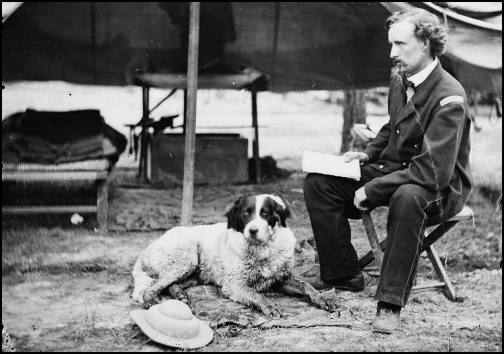 And so Mike Maguire and I have completely remade my one-man music theater piece Custer and Sitting Bull. Mike (whose composing name is M.C. Maguire) is not only one of the most surprising and innovative composers around, but an expert commercial sound engineer with broad experience in commercials and film. So I gave him the MIDI files and some general pointers, and he's completely refitted the piece with new sounds, from the ground up - we got together in Toronto to go over the results with a fine-tooth comb. Mike's sounds are indeed grittier, livelier, more energetic than the ones Dale Hourlland and I had once coaxed out of 1999 technology, but - what's most important to me - they feel as supple and definite to perform with. I hope this stills some of the complaints I get about my electronic timbres, and if not, that's the end of the line - my music is not for everyone. It's my observation that some people are so attuned by pop music that they can listen only to production, to the extent that distinctions of syntax escape them if unorthodox production values get in the way. And then, to people reluctant to bend their ears to it, microtonal music will always sound simply out-of-tune, and the strangeness gets projected onto other elements as well.
And so Mike Maguire and I have completely remade my one-man music theater piece Custer and Sitting Bull. Mike (whose composing name is M.C. Maguire) is not only one of the most surprising and innovative composers around, but an expert commercial sound engineer with broad experience in commercials and film. So I gave him the MIDI files and some general pointers, and he's completely refitted the piece with new sounds, from the ground up - we got together in Toronto to go over the results with a fine-tooth comb. Mike's sounds are indeed grittier, livelier, more energetic than the ones Dale Hourlland and I had once coaxed out of 1999 technology, but - what's most important to me - they feel as supple and definite to perform with. I hope this stills some of the complaints I get about my electronic timbres, and if not, that's the end of the line - my music is not for everyone. It's my observation that some people are so attuned by pop music that they can listen only to production, to the extent that distinctions of syntax escape them if unorthodox production values get in the way. And then, to people reluctant to bend their ears to it, microtonal music will always sound simply out-of-tune, and the strangeness gets projected onto other elements as well.
This is no apology, for none is needed. Mike did a fantastic and creative job, amplifying effects beyond my ability to conceive of electronically, and even making suggestions that tightened up the syntax. I wish I could hire him for many more such projects, but he's got his own unutterably complex music to write. Here are the new versions for you to give a listen to:
Custer: "If I Were an Indian..." (8:42)
Sitting Bull: "Do You Know Who I Am?" (8:17)
Sun Dance / Battle of the Greasy-Grass River (7:59)
Custer's Ghost to Sitting Bull (10:04)
And if you want, you can compare them to the old ones (originally issued on Monroe Street), below. I'd be curious how much change people think there is:
Custer: "If I Were an Indian..." (8:42)
Sitting Bull: "Do You Know Who I Am?" (8:17)
Sun Dance / Battle of the Greasy-Grass River (7:59)
Custer's Ghost to Sitting Bull (10:04)
Also, the Monroe Street version was recorded before I had performed the piece live. After some three dozen or so performances, I think I intone the text much better in the new version. Program notes and texts are here, and recently, without mentioning it, I uploaded as a PDF the entire 322-page MIDI score, which you can find here - though it's 146 MB in size, and a hell of a long download. (You can still get a bound hard-copy score from Frog Peak for only $20, and it'll be a lot more convenient.) Though I wrote it between 1995 and '99, I still consider it my most ambitious and successful piece, at least in terms of integrating the harmonic and rhythmic sides of my musical language. I'll be giving the world premiere of this new version October 9 in Amsterdam, at the Karnatic Lab.
I tend to buy more scores in the UK than CDs. The kinds of British composers who get their recordings into the stores are, as here only more so, not really the postclassical variety. I don't listen to the recordings I already have by Harrison Birtwhistle, Thomas Adès, James Dillon, Peter Maxwell Davies, and so on, avidly enough to justify busting my frail bank account of puny little Americo-dollars trying to get every recording I'd never seen before by them all. I do, however - and it is always my first act in London - run through the entire piano music collection at Foyles, followed in short order by the orchestral and chamber scores. Then I head for Travis & Emery at Circle Court and see what they've got in. This trip, in addition to purchases already mentioned, I landed Feldman's Coptic Light, Messiaen's Vingt Regards, Pärt's Fratres, and quite a bit of piano music by Howard Skempton, Michael Parsons, and Christopher Hobbs. (Did I ever tell you about the critic down south who decided to translate the title of Vingt Regards sur l'Enfant Jésus and came up with, "Give My Regards to the Infant Jesus"? True story. "And remember me to the Holy Ghost," I guess.)
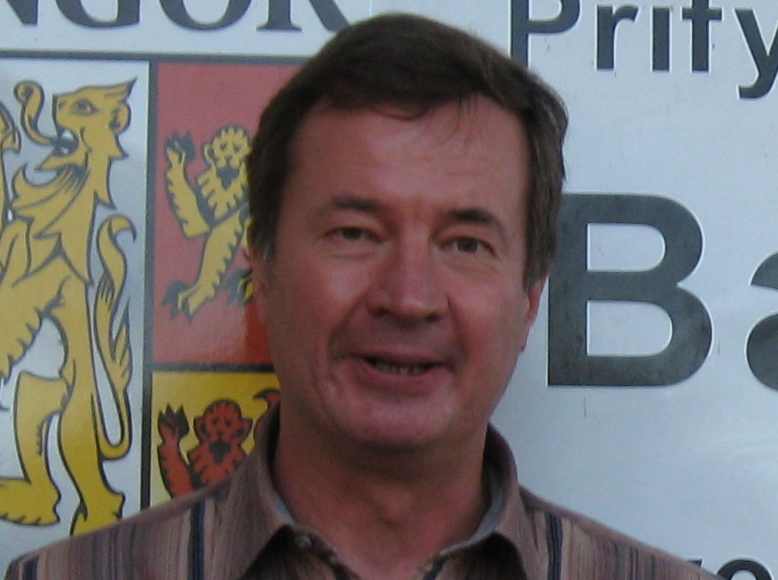 But you knew I'd come back from a minimalism conference with some new obscuuuuuuuure recordings for Postclassic Radio, and I haven't disappointed you. You'll hear plenty of CDs that give me that "Titles not found in CDDB database" message when I load them into iTunes. Christopher Hobbs, as I mentioned, was at Wales. I called him one of the original British minimalists, but I note now that he was born only in 1950. From the fact that Michael Nyman was writing about his music in 1974, I had him pegged for much older - that would have been like someone writing about my music in 1979, which no one was. But Hobbs's Sudoku pieces, based on the newspaper puzzle (never worked one myself), are exotically listenable and remarkably varied, and after hearing them here you can get them at Experimental Music Catalogue.
But you knew I'd come back from a minimalism conference with some new obscuuuuuuuure recordings for Postclassic Radio, and I haven't disappointed you. You'll hear plenty of CDs that give me that "Titles not found in CDDB database" message when I load them into iTunes. Christopher Hobbs, as I mentioned, was at Wales. I called him one of the original British minimalists, but I note now that he was born only in 1950. From the fact that Michael Nyman was writing about his music in 1974, I had him pegged for much older - that would have been like someone writing about my music in 1979, which no one was. But Hobbs's Sudoku pieces, based on the newspaper puzzle (never worked one myself), are exotically listenable and remarkably varied, and after hearing them here you can get them at Experimental Music Catalogue.
Also going up (and locatable at the same web address) are piano pieces by Hobbs's colleague Michael Parsons, whose Satie-ish piano works are surprising, quirky, and charming. Hobbs, Parsons, Skempton, and John White are among that generation of truly postclassical British composers of the 1970s whom Nyman's Experimental Music book teased us with, and then we almost forgot they existed. Turns out they've continued to make increasingly beautiful and subtle music without every losing their experimental spirit. Whether there is a younger British generation following in their footsteps, aside from Chris Newman whose work I already knew, I didn't find out.
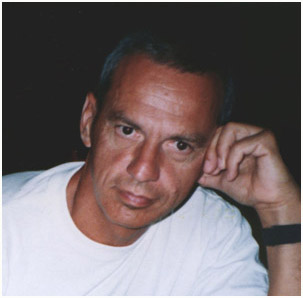 And on the subject of Serbian postminimalism, which I'm sure you've brought up at a cocktail party by now, I'm happy to present several pieces by my new friend Vladimir Tosic (b. 1949 - his last name needs a couple of diacritical marks that I can't achieve with this keyboard). Tosic adheres to what he calls "reductionist techniques," which I guess is how they talk about minimalism in Belgrade, but his music does sound somwhere in-between the studied flatness of American minimalism and the affectless irony of Russian postminimalism. It is often, withal, hauntingly beautiful, and to prove that I'm putting one piece, Voxal for piano and string orchestra, on my web site where you won't have to search for it. In Serbia, someone whose music melts on the ears as languidly as Harold Budd's can get access to orchestras, and if you've wondered what that would sound like, - click!
And on the subject of Serbian postminimalism, which I'm sure you've brought up at a cocktail party by now, I'm happy to present several pieces by my new friend Vladimir Tosic (b. 1949 - his last name needs a couple of diacritical marks that I can't achieve with this keyboard). Tosic adheres to what he calls "reductionist techniques," which I guess is how they talk about minimalism in Belgrade, but his music does sound somwhere in-between the studied flatness of American minimalism and the affectless irony of Russian postminimalism. It is often, withal, hauntingly beautiful, and to prove that I'm putting one piece, Voxal for piano and string orchestra, on my web site where you won't have to search for it. In Serbia, someone whose music melts on the ears as languidly as Harold Budd's can get access to orchestras, and if you've wondered what that would sound like, - click!
Keith Potter informed me that, since my last visit to London, John Buller had died (in 2004, aged 77). Buller had to be one of the most wildly original figures in British music. His Proença of 1977 set a number of troubadour songs with an electric guitar in the orchestra. The Theatre of Memory (1981), based on Renaissance memory techniques, began with the orchestra members all playing chaotically at their own rate, after which the conductor finally walks onstage and brings them together with a resounding downbeat. Startling stuff, with a notational looseness sort of in the Crumb/Kagel/Schwantner realm, but more substantial and engaging, in my opinion, than any of those names. You've never heard of him. Like the US, the UK puts its staid, "respectable" composers in the limelight, and hides its crazy endearing geniuses under a bushel. That must be where we inherited it from.
Thoughts on traveling:

Little things about England make you feel more adult than the U.S. makes you feel. Like, in most public restrooms, the water in the sink stays on until you turn it off, instead of auto-switching off after six seconds. The bathroom does not send you a message, "You're probably too irresponsible to turn the water off yourself, jackass, so we've already arranged to do it for you."
On the other hand, while the British I end up talking to are preternaturally and enviably articulate, soft-spoken, and intelligent-sounding, their newspaper journalism always reads like it's shouting at imbeciles.
And why do Brits invariably serve coffee at 211 degrees Fahrenheit? It's half an hour before you can drink it. As for the other kind of hot, I ordered the penne arrabiata at an Italian restaurant, and the nice waitress said, "I have to warn you it's extremely spicy." "I can take it," I replied confidently. It was about as spicy as children's canned Spaghetti-O's. "You'd be surprised at how many people complain it's too spicy to eat," she protested afterward.
By allowing myself to pretend that British pounds were actually dollars, I got by without too much trepidation at the money I was spending, but at the tobacco shop, even that stratagem failed. The Cuban Cohibas I had been whetting my lips for for months were £21.50 - some $43 under current exchange rates. I had never spent more than $16 for a cigar in my life, and the thought of suddenly more than doubling that was almost enough to make me give up cigars for a couple of weeks. I said almost. I compromised on a couple of examples of a cheaper but still-Cuban brand, and made a note to bring my perfectly nice Nicaraguans from the U.S. when I return.
I tell people lately that I leave the U.S. as often as possible on the same theory that one jumps up and down in a falling elevator - so as not to be there when it crashes. But no one in the UK mentioned politics, I never had to apologize for being an American, and as I got off the plane I realized that the horrific name "Dick Cheney" hadn't flashed through my mind in ten days. The nicest thing about being over there was no longer walking around with an oppressive sense that My Country Is Doing Terrible Things, and We're Helpless to Do Anything about It. It wears you down, all this constant monitoring of the criminals who are ransacking the government, reinstituting medieval torture, and cutting long strips out of the Constitution. It was such a relief Not Knowing, and being among people who seemed to shrug it off. Maybe they're naive or cynical, or just too polite, or too implicated by their own government, but there's no question that living every day with the consciousness that your government has gone maliciously berserk lacerates one's spirit, reinforcing every guilty and self-loathing tendency. I'm looking forward to heading for Copenhagen and Amsterdam next week and forgetting about it again - I hope the Danes and Dutch are as forgiving.
Trying to get from JFK to Penn Station, I was herded on to a $15 bus that was promised to take me there. During the 20-minute wait it occurred to me that the cab would have been only $20, and would have left immediately - and then the bus dumped me out at Grand Central, the driver directing me to a nearby van for the rest of the trip. And both drivers kept mentioning that tips were greatly appreciated. The London Tube service hadn't, in my experience, improved as much as I had been assured, but then you walk into an institutionalized, unashamed scam like New York City, and you only want to go back.
The Menai Bridge, built in 1826:

This morning in a book store in Wales I found a fat, impressive tome titled, "Hanes Cerddoriaeth y Gorllewin." It meant nothing to me until I read down to the authors' names: Grout and Palisca. Yes, that's right, the Grout History of Music, that scourge of music undergrads, is translated into Welsh. ("Cerddoriaeth" is Welsh for "music.") At £25, it was almost worth buying to display prominently in my office, but too heavy to lug around in my suitcase.

The FIrst International Conference on Minimalism and Music ended impressively Sunday morning with a session of papers looking toward the future. David McIntire of the University of Missouri at Kansas City gave a paper, "Terminology and Meaning in a Post-Minimalist Style:The Case of Totalism," in which he quite accurately recounted, with photos and score examples in a Powerpoint presentation, the history of the movement's recognition so far - including a photo of Rudy's Bar in New York where the word was coined! It was the first time I've ever seen anyone besides myself talk on the subject, and David reports widespread enthusiasm for totalism among UMKC students.
Local composer Geraint Lewis was charged with the obligatory summation of minimalist activity within Welsh music, and since there's hardly been any, his sense of humor about it was a blessing. (But can you name the three most famous recent Welsh composers? Grace Williams, Daniel Jones, David Wynne.) Tara Wilson closed with a paper on Russian postminimalists (Martynov, Batagov, and others) that insightfully differentiated their attitudes from those of their American counterparts. Noticeable, she said, and it accorded with my experience of the music, were the Russians' lack of interest in acoustic phenomena, their ironic use of tonal materials as historic references rather than a neutral markers within a process, and the practice of kryptophonia: the derivation of melodies from secret messages, sometimes via correspondences between pitches and letters in phrases. I immediately added the word to my vocabulary, but first mistook her to say kleptophonia, which also offers intriguing possibilities.
It had never occurred to me how helpful it might be to hear other people analyze so much of the music I'm specifically interested in. Usually at an academic music conference I'm lucky if I can find two or three papers of any particular interest at all, but every paper on this entire conference, if not all necessarily stellar, was on a subject dear to my heart. I've been working alone in the analysis of minimalist and postminimalist music for so long that I had forgotten that it was possible to learn from colleagues, that for some things five, or thirty, heads are better than one. Others must have felt much the same way, for after the final session, organizers Pwyll ap Sion (author of a new book on Michael Nyman) and Tristian Evans gathered together all who'd stay for a discussion of the conference's possible future history. We spontaneously formed the Music and Minimalism Society, members pictured below (except for me who's taking the photograph):
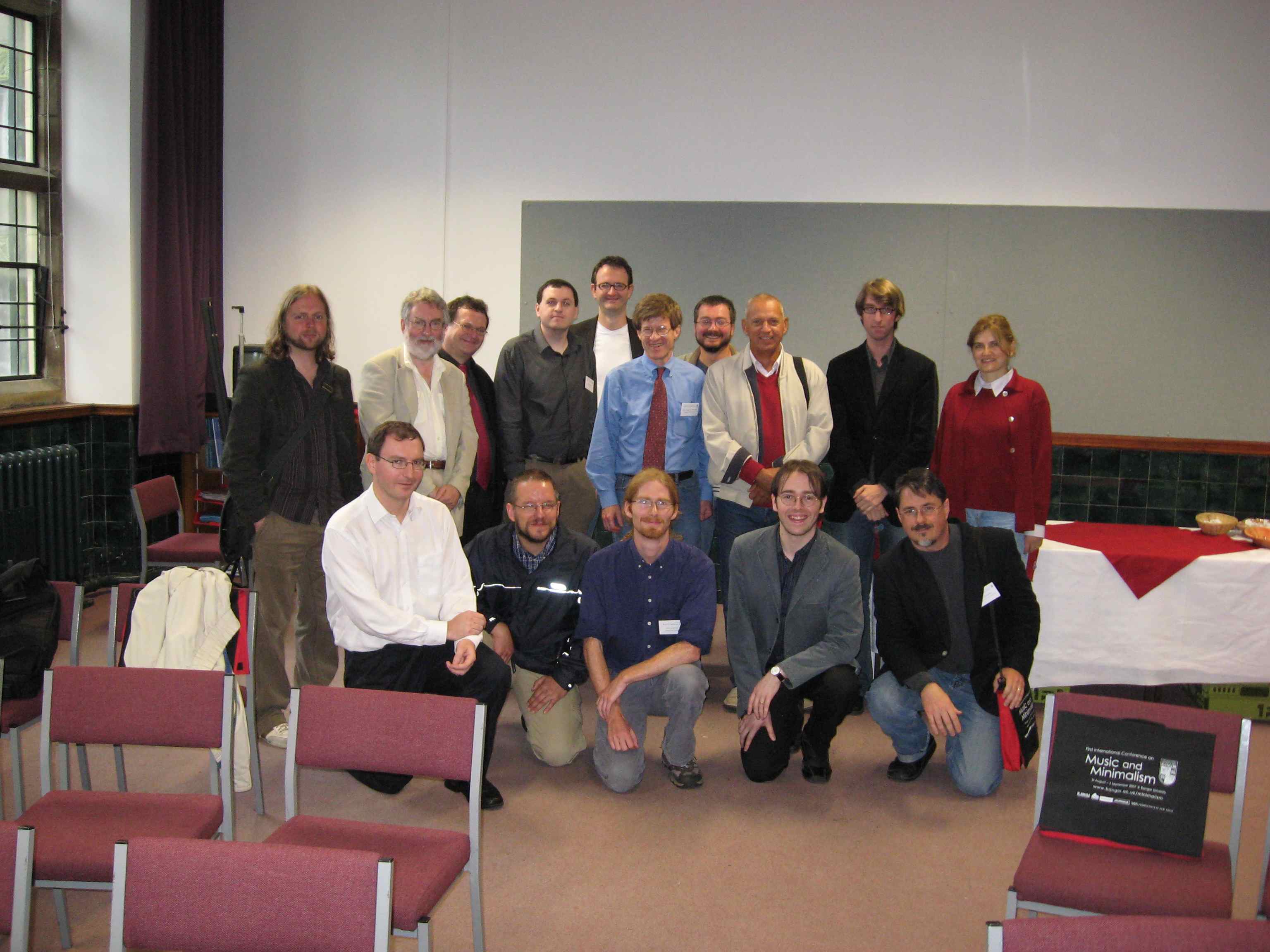
and agreed that the conference should be held every two years, alternating between Europe and the U.S. As a member of the new steering committee, I'll keep you apprised of plans. Meanwhile, let it be noted that minimalism now possesses a strong and undeniable base of support and scholarship in international musical academia. And we ain't going back.
Meanwhile, back in London: TUBE STRIKE! Just spiffy.
First International Conference of Music and Minimalism, University of Wales, day 2:

I've been asked how many people are here: there are 34 papers over the three days, and I'd guesstimate that accounts for about half the people attending. Today was a little more diverse than yesterday, not quite as consistently exciting, but long and dense. A lot of us have been talking about how great it is to be able to indulge our enthusiasms for various obscure minimalisms amidst other academics without having them sneered at. Jonathan Bernard (U. of Washington) stepped in to play pop music indistinguishable from minimalism (Orbital, Eno, King Crimson, Sigur Ros, Villalobos, Plastikman, and others), and to warn us that someday soon minimalism may seem like merely a classical tributary into a much larger worldwide movement. John Pymm (U. of Wolverhampton) analyzed how Reich's recent works warn us about technology, John Richardson (U. of Jyväskylä, Finland) deconstructed Glass's La Belle et la Bête, but had to admit he was as clueless as the rest of us why Glass couldn't turn off the arpeggio machine now and then. I learned a hell of a lot about John Adams's music, which I've barely ever analyzed - everything I ever wanted to know except why he's considered a minimalist. And Scott Cook (U. of British Columbia) revealed that Gavin Bryars has made a career out of the same kinds of third-related triad shifts I've been composing with since I first heard Einstein on the Beach.
Amid all the theorists (who now spout neo-Riemannian theory about L and LPL transformations and UTTs as though we're all supposed to know what those are), there was one geniune composer celebrity. Christopher Hobbs, one of the original British minimalists whom I'd not heard a word about in decades, surfaced and played some of his new music, based on Sudoku puzzles, which he's been using much as Cage used the I Ching. May sound hokey, perhaps, but he came up with a surprisingly varied and attractive array of ambient and percussive textures, and one piece that reminded you of Japanese Gagaku music was titled Sudogagakuku. You'll be hearing some on Postclassic Radio shortly.
Of more immediate impact, perhaps, was Virginia Anderson's talk on British "systems music." This was a '70s movement involving Hobbs, John White, Gavin Bryars, Michael Parsons, Michael Nyman, High Shrapnel, and others, who got into making music via strict numerical systems. For months now, the Minimalism article at Wikipedia has claimed that "the term was used informally as a term for all minimalism in the 1980s." Anderson explained: by the 1980s, the systems movement was in decline, and as its original referent faded from memory, critics who weren't very sympathetic to the movement in the first place (like Paul Griffiths) continued attaching the term to Nyman, as he became famous. Since Nyman changed style to write more like Reich and Glass, lazy and uninformed writers (whom she named, with citations) who didn't know the original context started lumping in Riech and Glass with Nyman as "systems composers." But as Anderson said, "With that kind of definition, it doesn't mean anything anymore, does it? We have a perfectly good word for [what Glass and Reich were doing]: minimalism. Systems music was a different kind of music with a divergent and separate history."
In other words, Wikipedia's claim is trivially true that systems music "was used informally as a term for all minimalism in the 1980s" - by people who didn't know systems music from a hole in the ground. Anderson, who appears to be the leading expert on that movement - at least Hobbs, who was there, seemed to think so - has corrected Wikipedia's ignorant claim, but the infinite sages there keep putting it back.

Christopher Hobbs and Virginia Anderson.
Sites To See
AJ Blogs
AJBlogCentral | rssculture
Terry Teachout on the arts in New York City
Andrew Taylor on the business of arts & culture
rock culture approximately
Laura Collins-Hughes on arts, culture and coverage
Richard Kessler on arts education
Douglas McLennan's blog
Dalouge Smith advocates for the Arts
Art from the American Outback
Chloe Veltman on how culture will save the world
For immediate release: the arts are marketable
No genre is the new genre
David Jays on theatre and dance
Paul Levy measures the Angles
Judith H. Dobrzynski on Culture
John Rockwell on the arts
innovations and impediments in not-for-profit arts
Jan Herman - arts, media & culture with 'tude
dance
Apollinaire Scherr talks about dance
Tobi Tobias on dance et al...
jazz
Howard Mandel's freelance Urban Improvisation
Focus on New Orleans. Jazz and Other Sounds
Doug Ramsey on Jazz and other matters...
media
Jeff Weinstein's Cultural Mixology
Martha Bayles on Film...
classical music
Fresh ideas on building arts communities
Greg Sandow performs a book-in-progress
Harvey Sachs on music, and various digressions
Bruce Brubaker on all things Piano
Kyle Gann on music after the fact
Greg Sandow on the future of Classical Music
Norman Lebrecht on Shifting Sound Worlds
Joe Horowitz on music
publishing
Jerome Weeks on Books
Scott McLemee on books, ideas & trash-culture ephemera
theatre
Wendy Rosenfield: covering drama, onstage and off
visual
Public Art, Public Space
Regina Hackett takes her Art To Go
John Perreault's art diary
Lee Rosenbaum's Cultural Commentary
